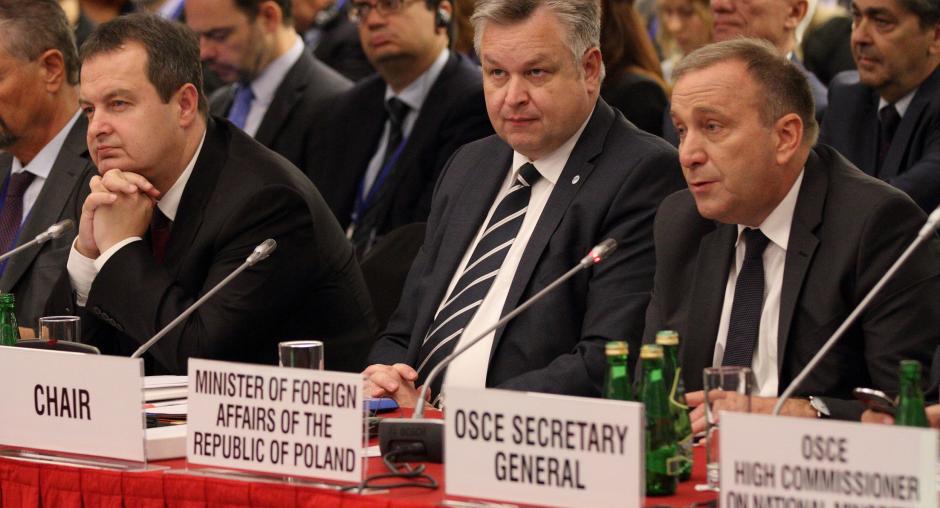Human rights have to be at the centre of policy on migration crisis, say speakers at OSCE conference in Warsaw

WARSAW, 21 September 2015 – OSCE participating States have to ensure the protection of the human rights and dignity of migrants in addressing the current crisis in Europe, speakers said at the opening in Warsaw today of a two-week OSCE conference focusing on democracy and human rights.
"At a time when thousands of people are risking their lives leaving the countries in the OSCE neighbourhood affected by conflicts, we must not forget the human rights and humanitarian aspects of the migrant crisis," said Ivica Dačić, OSCE Chairperson in Office and Foreign Minister of Serbia. "Building fences, closing borders, the use of excessive force against the people who are fleeing from devastating conflicts are not in line with human rights commitments participating States of this Organization have promised to respect."
Speaking at the opening session of the OSCE’s Human Dimension Implementation Meeting, Secretary General Lamberto Zannier stressed that all security discussions within the Organization, including on the crisis in and around Ukraine, have to be grounded on the commitments that participating States have made to each other.
“The crisis in and around Ukraine has opened a difficult and divisive debate about the consequences of violations of key OSCE principles and commitments, including in the human dimension,” Zannier said. “Despite these profound challenges, the OSCE has managed to hold true to its vision of comprehensive security, and we continue to support efforts to restore peace and stability, including by promoting dialogue and reconciliation.”
With many of the countries within the OSCE searching for solutions to the current migration crisis in Europe, the need for a human rights focus in these efforts was a common theme.
“Too many of those caught in this crisis have fled dangerous, horrible conditions, only to be confronted by discrimination, violations of their human rights and, in some cases, the loss of their lives,” said ODIHR Director Link. “These dangers have to be addressed directly in the search for policy solutions. Instead of pouring resources into building walls and barriers that leave human beings vulnerable, I call upon all states concerned to ensure that the human rights of all of these people in dire need are protected while managing the refugee crisis.”
“This meeting reminds us of the central meaning of the OSCE commitments in the human dimension. Many problems for the implementation of these commitments persist in the OSCE area. In addition, thousands of refugees are crossing borders and continents to escape war and terror, as well as the suppression of their basic rights and freedoms,” said Gernot Erler, Special Representative of the Federal Government for Germany’s 2016 OSCE Chairmanship. “In addressing all these challenges we should reaffirm again and again that respect for human rights is a central pillar of personal security, enduring stability and lasting peace, and act accordingly.”
Some 1,400 participants from governments and civil society will gather at the conference over the next two weeks to scrutinize participating States’ performance in meeting their commitments in areas such as freedom of expression, free media and information, freedom of movement and other fundamental freedoms, the promotion of mutual respect and understanding, the rule of law and gender equality.
“The human dimension is a fundamental component of the OSCE’s comprehensive concept of security. But this concept requires that all participating states fulfill their commitments undertaken in the field of democracy, human rights and the rule of law,” said Grzegorz Schetyna, Foreign Minister of Poland. “The Polish peaceful transition proved how important efficient democratic institutions are, that freedom of speech, freedom of media and strong civil society are essential for long-term social development and political stability. “
